
Why SEO Monitoring is Non-Negotiable in 2025
SEO monitoring tools are platforms that track your website's search performance, keyword rankings, backlinks, and technical health, while also providing insights into competitor strategies. With search changing faster than ever, these tools are no longer optional.
AI is taking up more space in search results, organic clicks are harder to earn, and Google's algorithm updates keep everyone on their toes. The rise of AI Overviews means you need tools that track both traditional rankings and your brand's presence in AI-generated responses. Without the right monitoring tools, staying ahead is nearly impossible.
With over 350 SEO tools on the market, choosing the right one can be overwhelming. You need accurate rank tracking, site audits, competitor intelligence, and automation, all within a manageable budget. As the founder of Paige, an AI-powered local SEO platform used by over 10,000 businesses, I've tested dozens of SEO monitoring tools. I've seen which ones deliver results and which are just noise. This guide will walk you through the tools that matter most in 2025.
Here are the top categories to consider:
All-in-One Platforms:
- Semrush - Best for competitor analysis
- Ahrefs - Best for backlink research
- SE Ranking - Best value for agencies
Specialized Tools:
- Screaming Frog - Technical SEO audits
- Google Search Console - Free performance data
- Local Falcon - Local SEO tracking
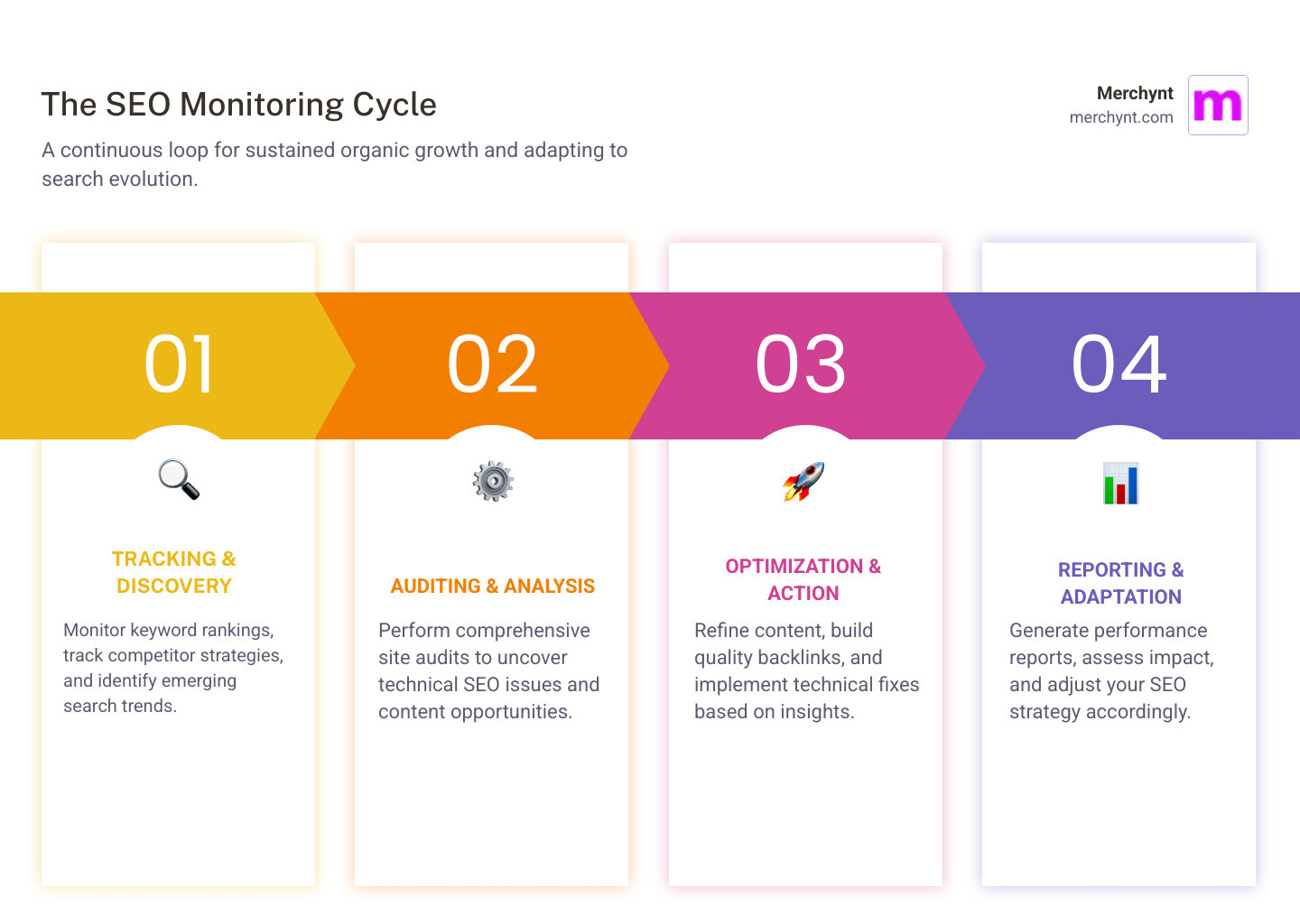
Choosing Your Weapon: Key Features of Top SEO Monitoring Tools
With AI reshaping search results and organic clicks getting squeezed, you need SEO monitoring tools that are strategic allies, not just data collectors. Here are the key features that separate the game-changers from the time-wasters.
Core Functionality to Demand
These are the foundational features every good SEO tool must have.
Rank Tracking: You need 100% accurate keyword rankings, not estimates. The best tools show daily fluctuations and track competitors, helping you spot trends before they become problems. Our SEO Keywords Ranking Tool guide dives deeper into this crucial data.
Site Audits: A good site audit tool simulates how search engines crawl your site, catching technical SEO shortcomings like broken links, duplicate content, and indexing issues that can kill your rankings.
Backlink Analysis: Quality matters more than quantity. The right tool helps you analyze your backlink profile, spot toxic links, and find competitor link-building opportunities.
Competitor Analysis: The best tools let you uncover the keywords and content strategies driving your competitors' success, allowing you to find and exploit gaps to gain a competitive edge.
Advanced Capabilities for a Competitive Edge
These features separate the pros from the amateurs.
AI and Automation: Modern tools must track your brand's presence in AI Overviews and monitor mentions in LLMs like ChatGPT. Predictive analytics and automation help you spot opportunities and streamline workflows.
Reporting and Dashboards: Look for customizable dashboards that tell a clear story. White-label reports are essential for agencies to maintain their branding and deliver professional, digestible client updates. For more on this, see our guide on Best SEO Reporting.
Integrations: Seamless integration with Google Analytics and Google Search Console is non-negotiable. It saves time and allows for deeper, more unified analysis.
User Experience (UX): A powerful tool is useless if it's too complicated. A clean, intuitive interface ensures your team will actually use it, turning the tool into an indispensable asset rather than a dusty subscription.
The right combination of these features transforms SEO from guesswork into a data-driven strategy. For local SEO, specialized automated platforms can often deliver superior results with less complexity.
The Ultimate Review of SEO Monitoring Tools for 2025
We've tested numerous options and gathered expert insights to bring you our top picks for the year. This section reviews the leading all-in-one and specialized platforms to help you make an informed choice.
Semrush: The Competitor Analysis Powerhouse
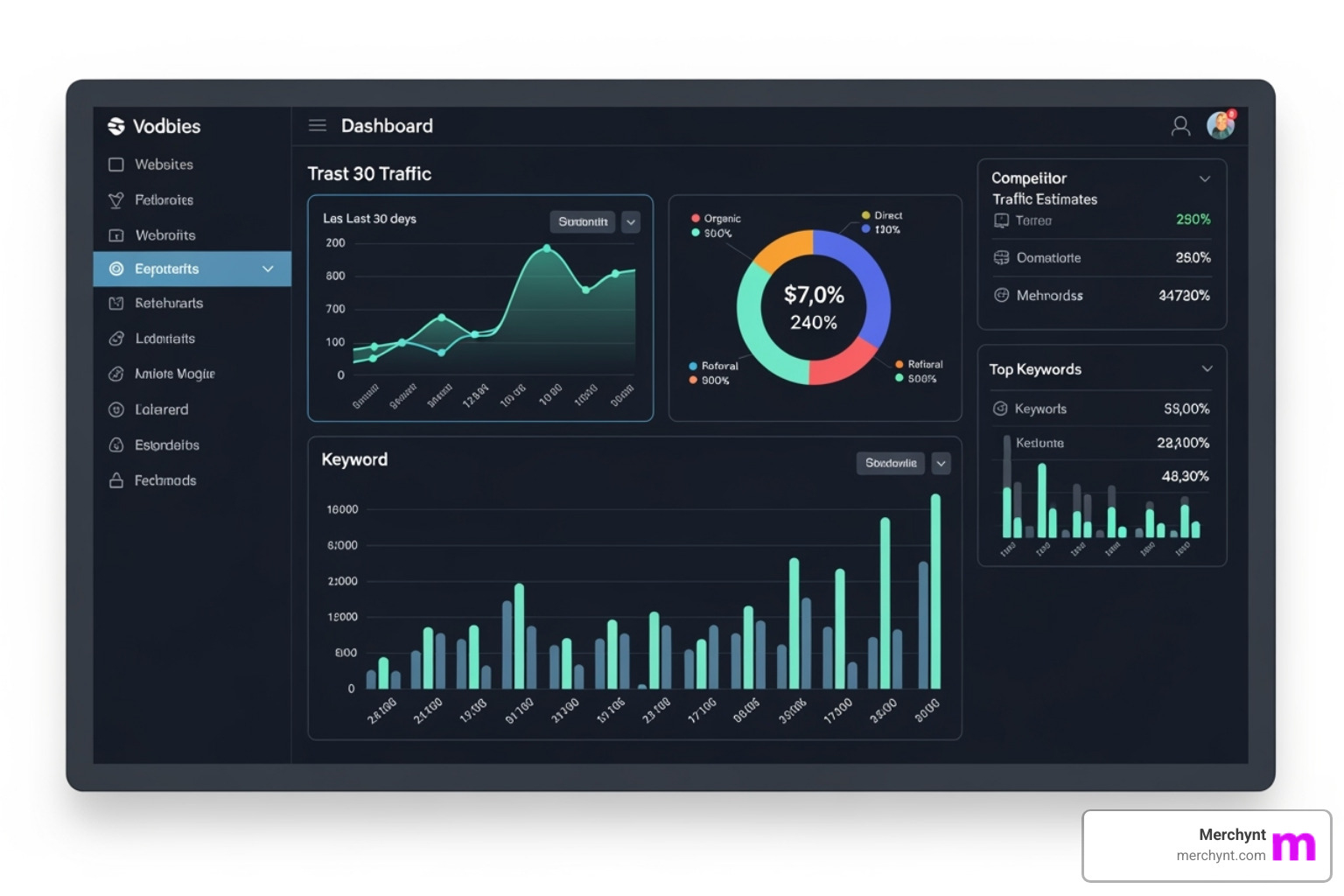
If you need to dissect competitor strategies, Semrush is our top pick. Its Domain Overview tool is excellent for tracking any website's organic search performance and uncovering the keywords driving their success. Semrush is also a leader in AI SEO with its AI SEO Toolkit, designed to help businesses monitor their brand's presence in ChatGPT, Gemini, and other LLMs. This is crucial as AI plays a larger role in search.
- Strengths: Unparalleled competitor analysis for keywords, backlinks, and PPC ads. Its AI integration for brand visibility in LLMs is a cutting-edge feature.
- Weaknesses: The vast number of features can lead to a confusing user experience for some. Its premium pricing can be a significant investment.
- Pricing: Plans start from $139.95 per month. A limited free plan is available.
- Verdict: An indispensable tool for serious competitive analysis and understanding AI search presence.
Ahrefs: The King of Backlinks and Content Research
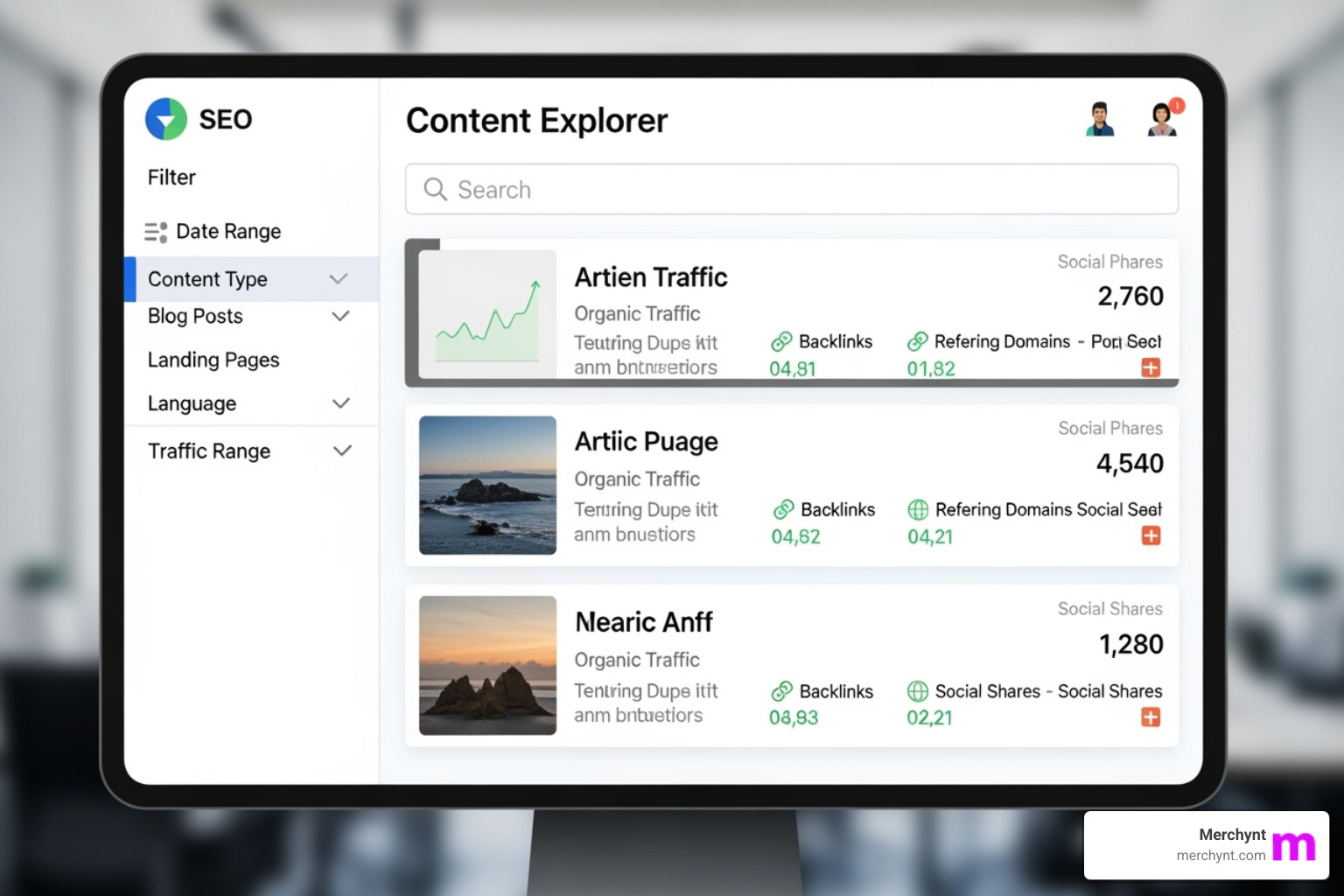
Ahrefs is another top-tier all-in-one platform, particularly strong in backlink analysis and content research. Its Content Explorer is a standout feature for finding content ideas, and its clean interface makes deep analysis a pleasure. The platform is renowned for its accurate, timely ranking data and detailed keyword analytics, backed by an impressive data infrastructure.
- Strengths: Incredibly accurate data, especially for backlink profiles. The intuitive interface and powerful Content Explorer make it great for ideation. Its Site Audit feature is also robust.
- Weaknesses: Some users have expressed frustration with recent pricing changes. Depending on the plan, it may offer fewer features than competitors at a similar price point.
- Pricing: Plans range from a limited Starter plan to comprehensive Enterprise solutions.
- Verdict: Essential for deep backlink analysis, content ideation, and comprehensive SEO monitoring.
SE Ranking: The Best All-in-One Value

SE Ranking impresses with its blend of powerful features, user-friendliness, and excellent value, making it a top choice for agencies and SMBs. It's a comprehensive toolbox that provides 100% accurate keyword rankings and unique insights from its advanced data processing. Agencies will appreciate its white-label reports and client seats. The platform is also continuously improving, with an "AI Overviews rank tracking" feature currently in beta.
- Strengths: Fantastic price-to-quality ratio. The user-friendly interface, continuous product development, and robust local SEO features are significant advantages.
- Weaknesses: Some users have found the interface bulky in the past, though improvements are ongoing. Pricing has increased in recent years.
- Pricing: Plans start from $65/month, with add-ons available.
- Verdict: An excellent all-in-one solution that provides strong capabilities and continuous innovation at a competitive price.
Screaming Frog SEO Spider: The Technical SEO Standard
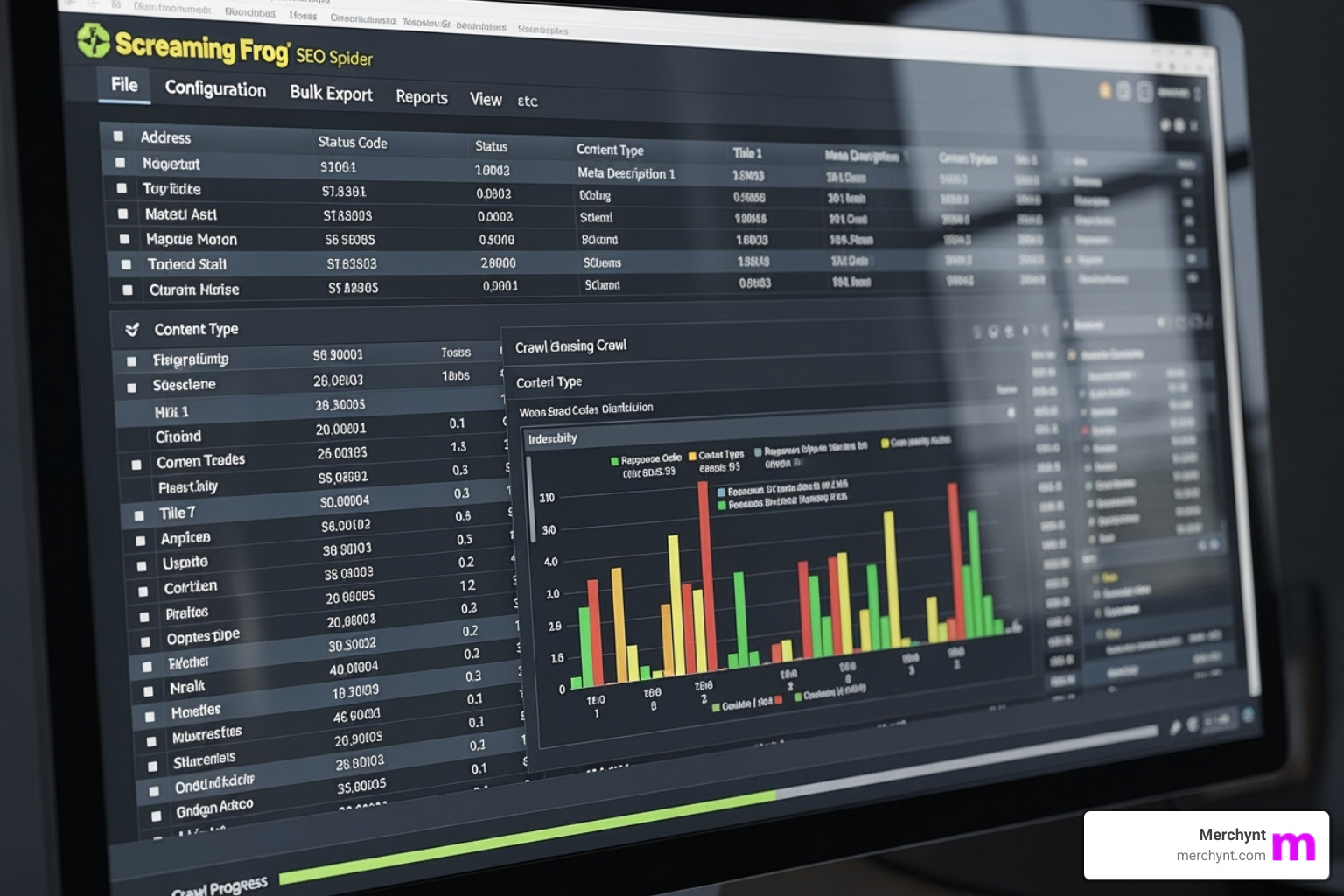
For deep technical SEO audits, Screaming Frog SEO Spider is an indispensable workhorse. This desktop crawler simulates how search engine bots view your site, revealing a treasure trove of technical issues. You can use it to find broken links, identify duplicate content, analyze meta tags, and much more. It can also integrate with GA4 and GSC for deeper insights.
- Strengths: Provides incredibly detailed technical analysis, making it a must-have for fixing site architecture issues. It's highly configurable and has a generous free version.
- Weaknesses: The interface can feel dated, and there's a steep learning curve for beginners. It is a specialized tool, not an all-in-one platform.
- Pricing: Free for up to 500 URLs. A paid license is available from $259/year.
- Verdict: The go-to tool for in-depth technical SEO audits, essential for ensuring a healthy website.
The Future is Now: AI, Automation, and Local SEO
The SEO landscape is shifting dramatically, with AI and local search playing dominant roles. Staying ahead means leveraging SEO monitoring tools built for this new reality.
How AI is Reshaping SEO Monitoring
AI's impact on SEO is profound. As noted earlier, "AI is taking up more space in the results," and the old playbook is becoming obsolete. This is about more than AI-written content; it's about how AI influences search and how we monitor our presence within it.
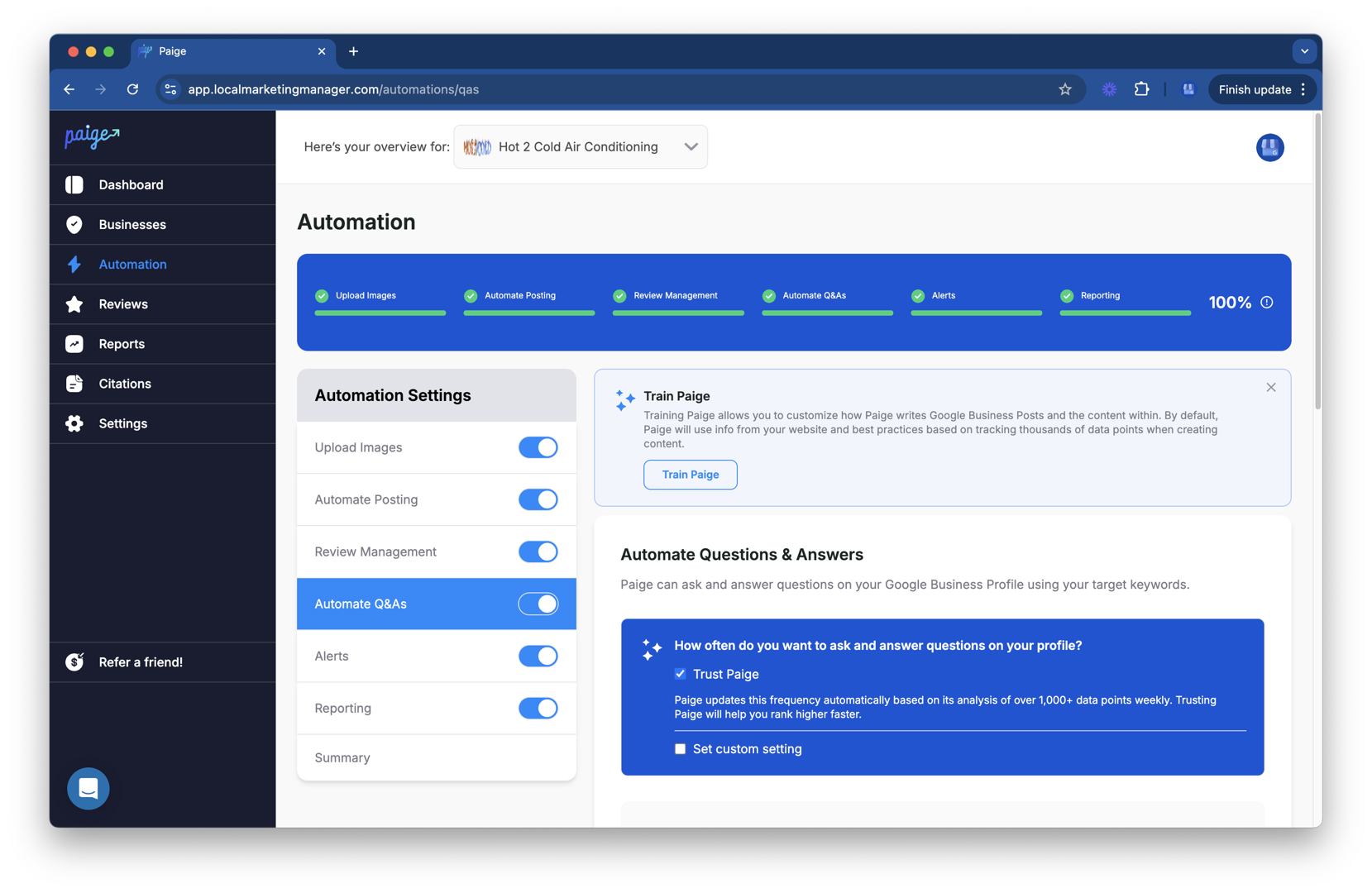
Key developments include:
- AI Overviews: Tools must now track visibility in these new, generative search snippets, not just traditional rankings.
- AI-Powered Content Optimization: Platforms like Clearscope and Surfer SEO use AI to guide content creation, ensuring it aligns with user intent as understood by AI algorithms.
- Predictive Analytics: Tools like Exploding Topics help find rising trends before they become mainstream, enabling proactive content strategies.
- Tracking Brand Mentions in LLMs: It's now vital to know how AI platforms like ChatGPT and Gemini talk about your brand. Tools like the Semrush AI SEO Toolkit help track Share of Voice, sentiment, and high-intent queries within these platforms.
The future points toward deeper AI integration and automated workflows. Our own platform, Paige, is an AI-powered, fully automated tool for Google Business Profile management, showcasing how AI can streamline complex local SEO tasks to deliver results without a steep learning curve.
Using SEO Monitoring Tools for Local Dominance
For most SMBs, local search is where the magic happens. Appearing in "near me" searches drives foot traffic and conversions, making local SEO a critical battleground.
The Google Business Profile (GBP) is the cornerstone of local SEO, powering your presence in Google Maps and local results. Monitoring and optimizing it is non-negotiable.
Local rank tracking is more nuanced than national tracking. You need to know how you rank in specific geographic areas. Specialized local rank trackers shine here, offering geo-grid map formats, often called a Heatmap Ranking Report, to visualize your visibility. These reports show exactly where you're strong and where you need to improve locally. For a full guide, see our Google Business Profile Heatmap Report Guide.
Advanced local SEO tools are also beginning to track visibility across AI platforms, introducing metrics like "Share of AI Voice (SAIV)" to quantify presence in AI responses. This is crucial because a business might rank well traditionally but be invisible to AI, representing a significant missed opportunity.
Review management is another vital piece of local SEO. Positive reviews boost credibility and rankings. Some tools even offer AI-powered features to help save time responding to reviews, protecting your online reputation.
For businesses focused on local customers, leveraging SEO monitoring tools with robust local capabilities is paramount. This includes all-in-one solutions with strong local features or specialized platforms that help dominate local rankings and manage your GBP effectively.
Frequently Asked Questions
Choosing the right SEO monitoring tools can be overwhelming. Here are answers to the most common questions we hear from business owners and marketers.
How do I choose the right SEO tool for my business?
The best tool is the one that fits your specific situation. Don't just look for the "best" overall; find the right fit for your needs, budget, and experience level.
- Assess Your Needs: Are you a local business focused on "near me" searches, or a content agency needing deep competitor analysis? Prioritize features accordingly.
- Consider Your Budget: Tools range from free (Google Search Console) to thousands per month. Set a realistic budget and stick to it. The most expensive tool isn't always the best choice.
- Evaluate Your Experience Level: Some tools are beginner-friendly, while others are built for technical experts. Choose a tool you'll actually use consistently.
- Use Free Trials: There's no substitute for hands-on testing. See if the interface is intuitive and the data makes sense to you before committing.
- Check for Core Functionality: Ensure your chosen tool covers the essentials: accurate rank tracking, site audits, backlink analysis, and competitor insights.
Are free SEO monitoring tools like Google Search Console enough?
Google Search Console is absolutely essential and free. It provides direct insights from Google about your site's performance, including clicks, impressions, and technical issues. Think of it as your direct line to Google.
However, GSC is not enough on its own. Its biggest limitation is that it only shows data for your own website. It won't tell you what your competitors are doing, which keywords they rank for, or what their backlink strategy is. This is a major blind spot in a competitive market.
Furthermore, GSC lacks the automation, advanced reporting, and deep analysis features of paid tools. While GSC is a necessary foundation, paid SEO monitoring tools provide the competitor intelligence and automation needed to build a winning strategy.
How often should I check my SEO reports?
The ideal frequency depends on your goals, but a three-tier approach works well for most businesses.
- Daily: Check volatile, high-value keywords, especially during active campaigns or after algorithm updates. This helps you react quickly to changes.
- Weekly: This is the sweet spot for general performance monitoring. It allows you to spot emerging trends and catch technical issues without getting lost in daily fluctuations.
- Monthly: Use this for strategic planning and client reporting. A monthly deep dive helps you analyze the bigger picture, review content performance, and guide strategy for the next month.
Modern SEO monitoring tools offer automated alerts, which notify you of significant changes, so you don't have to check manually all the time. For more on creating effective reports, see The Definitive Guide to Mastering Keyword Ranking Reports.
Conclusion: Finding Your Perfect SEO Toolkit
After reviewing the top SEO monitoring tools, it's clear there is no single magic bullet. The best approach is to find the right tool that aligns with your specific goals, budget, and team size. Whether you need Semrush's competitor analysis, Ahrefs' backlink data, SE Ranking's value, or Screaming Frog's technical audits, each platform offers unique strengths.
Our advice: take advantage of free trials. Test the tools yourself to see which one feels right for your workflow. An interface that looks great on paper might feel clunky in practice, while a simpler tool might be surprisingly effective.
Monitoring in an AI-driven world is essential for survival. With AI Overviews and LLMs changing how people find information, your tools must track your brand's presence in these new environments. This means embracing platforms with AI visibility tracking and predictive analytics.
For businesses where local search is the bread and butter, the stakes are even higher. Showing up in local searches can make or break your month, which is why having the right local SEO tools is game-changing.
This is exactly why we built Paige, our AI-powered fully automated solution for Google Business Profile management. While other tools have a steep learning curve, Paige works behind the scenes to rank your business higher on Google Search and Maps. It's designed for business owners who want results without becoming SEO experts. Our clients love Paige because it simply works and gets results.
The future of search is here. With the right SEO monitoring tools in your corner, you're not just prepared to adapt—you're ready to dominate.
Ready to see where you stand? Get a free audit of your Google Business Profile and find how Paige can transform your local search presence.
About Author

